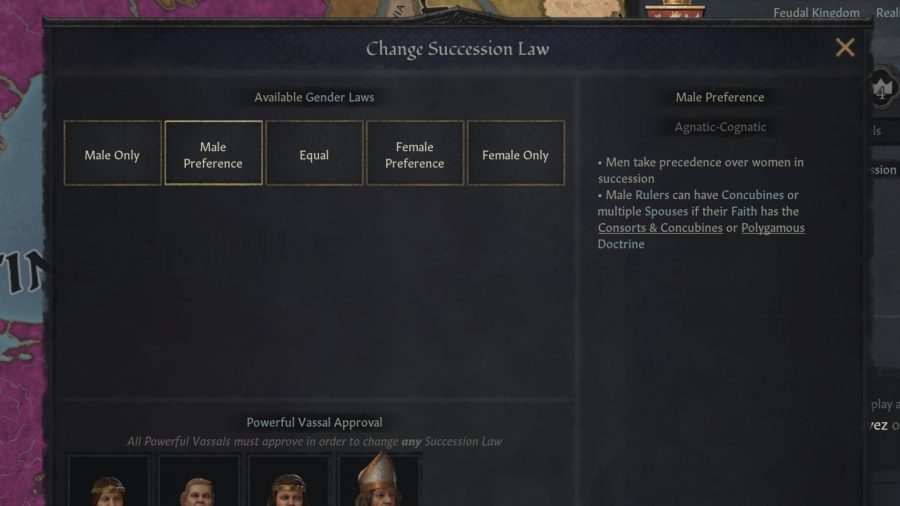How do succession laws work? Like many grand strategy games, Crusader Kings 3 is a complex mass of overlapping systems, but there’s one thing at the heart of them all: the age-old axiom “you can’t take it with you.” It’s a game that takes place over the course of hundreds of years, and so naturally you’re going to watch your character get old and die (often, they’ll even skip that first step).
What happens to all those titles you’ve been hoarding when your character goes to their eternal reward? That’s handled by succession laws, and understanding them is a key to preserving your family’s legacy, keeping your realm intact, and knowing how to shape your own goals.
The Venn diagram of religion, culture, sex, and politics in Crusader Kings 3 all intersect in what amounts to a first year law student’s trusts and estates course, and this guide will give you the basics on how succession works in Crusader Kings 3 and how you can use it to your advantage.
What are Crusader Kings 3 succession laws?
When your CK3 character shuffles off this mortal coil, all the titles they hold remain, and must be divided up between rightful heirs. Who those heirs are and how big a portion they’re each entitled to is determined by some combination of local traditions, realm laws, cultural norms, and religious doctrines.
At the top, there are realm-level succession laws, and these can either designate a single heir or multiple heirs. As a ruler, your goal will likely be to keep your realm from fracturing, and so you’ll likely want to try to enact a single-heir policy like primogeniture for simplicity’s sake. But as always in Crusader Kings 3, there are many ways to approach this problem and figuring out how to manage multiple heirs can be a rewarding puzzle. As a vassal, you’ll generally want your liege’s titles to split up as much as possible – unless you already stand to inherit a big chunk of their titles. If that’s the case, defending the status quo will be a top priority.
Single-heir succession laws
Primogeniture
- Your oldest eligible child inherits all of your titles, while younger children receive nothing.
Ultimogeniture
- Your youngest eligible child inherits all of your titles, while older children receive nothing.
House Seniority
- All titles pass to the oldest eligible member of your House, and your children receive nothing unless one of them happens to be the oldest House member.
Multiple-heir succession laws
Confederate Partition
- Titles are divided equally among the late ruler’s children, and new titles can be created for younger heirs. The player heir – that’s who you’ll continue to play as – will always receive the ruler’s primary title, the realm capital, and any associated de jure titles.
Partition
- Similar to confederate partition, but in this case, new titles aren’t created to ensure each child receives an equal rank.
High Partition
- Another variation on partition, this one favouring the eldest eligible child with at least half of the late ruler’s titles, including the primary title, realm capital, and any direct de jure titles associated with it.
Crusader Kings 3 gender laws
Feudal societies often had firmly held beliefs on who was fit to rule, and part of that is reflected in Crusader Kings 3’s gender laws. In some cultures, women were not permitted to hold titles and were barred from inheriting even pieces of their late parents’ kingdoms. In any realm you rule, you’ll have both succession laws and gender laws that apply to inheritance. Here’s how these laws appear in Crusader Kings 3:
Male Only (Agnatic)
- Women are disqualified from inheriting titles and claims
- Male rulers may take concubines or multiple spouses, if their faith allows it
Male Preference (Agnatic-Cognatic)
- Men take precedence over women in succession
- Male rulers may take concubines or multiple spouses, if their faith allows it
Equal (Cognatic)
- No preference is given to either male or female children in succession
- All rulers may take concubines, consorts, or multiple spouses, if their faith allows it
Female Preference (Enatic-Cognatic)
- Women take precedence over men in succession
- Female rulers may take concubines or multiple spouses, if their faith allows it
Female Only (Enatic)
- Men cannot inherit titles or claims
- Female rulers may take concubines or multiple spouses, if their faith allows it
Note that when you start a campaign in Crusader Kings 3, one of the options you can enable is to swap gender roles so that positions that were historically restricted to men can only be held by women, and vice versa.
Title succession laws
You might be tempted to think that all the titles in your realm will adhere to the same set of rules when it comes to inheritance – they’re your titles, after all, right? Like most things in the Middle Ages, it’s more complicated than that. Individual titles often have their own traditional rules for determining who is eligible to inherit them, and this can become an issue when you start dealing with a realm that covers multiple cultures and ancestral grounds.
There’s an easy way to tell which titles have their own traditional rules for succession: when you pull up your character sheet, the shield representing that title will have a little scroll icon superimposed over the corner. Click on the shield to pull up the title’s info panel, and you’ll see its particular succession laws, along with the current line of succession, down at the bottom of the panel.
Individual titles often come with idiosyncratic traditions specific to their de jure cultures. Ireland, for instance, has a special system called Tanistry Elective, in which the ruler and all vassals of one and two ranks below nominate someone to the office of the Tanist, which is traditionally a second-in-command position to the chieftain or king. The Tanist also becomes the heir, and vassals will tend to nominate candidates who are distant relatives rather than your close family. Be sure to check into the specific succession laws in titles you hold, otherwise you could be caught by surprise when it goes to someone other than your player heir when your ruler dies.
Changing succession laws
To change your realm succession laws, you’ll need to do a few things. First, you’ll need to make sure you have sufficient crown authority. Open the Realm panel by clicking the crown icon in the column on the right-hand column of the screen (or pressing F2).
You’ll see your level of crown authority near the top of the panel, represented by the icons numbered 1-4. Generally, to change to another multiple-heir succession law, you’ll need to have at least limited crown authority, which is the second of the four levels. To change the rules about which genders are eligible to inherit, or to change from a multiple-heir system to a single heir, you’ll need high crown authority, which is level three.
Raising crown authority requires you to spend prestige, so you’ll have to work on gaining more of that if you can’t afford the cost. You can also only move up or down one level at a time, and each time you change it, your vassals will change their opinions of you. Generally, they’ll like lower crown authority and hate higher crown authority. More crown authority is usually better for you, of course – the more you have, the less you have to worry about your vassals’ shrill whining.
Once you have the required crown authority, you find succession laws in the same realm panel. Open it, and select the Succession tab. Here you’ll find buttons for changing both succession and gender laws, and clicking those will pull up a panel where you can look at the requirements for changing them.
Depending on your level of crown authority, you also may need the approval of the powerful vassals in your court in order to make any significant changes to the law. If that’s the case, any vassals who disapprove of your plan will need to be dealt with – and how you go about doing that is up to you. You could win them over by granting them titles or using a sway scheme, but there are more nefarious ways to go about dealing with them as well.
You can also change the rules for title succession laws, but there’s a different process. Open the information panel for the title in question, and find the buttons at the bottom. You can remove the existing law or add your own, and each of these options comes with an associated cost in prestige – adding a Scandanavian Elective succession law to the title of Kingdom of Poland costs 1,500 prestige, for instance.
More Crusader Kings advice:
The best CK3 mods
CK3 console commands and cheats
Crusader Kings 3 beginner’s guide
Make sure to check on your realm’s succession laws frequently as you play Crusader Kings 3. Changing laws can be expensive and difficult to pull off politically, so starting out it’s best to simply make yourself aware of how things will work when your initial ruler dies and make sure you’re planning for your heirs’ future when you start eyeing up neighbouring territories to conquer. Remember: you can’t take it with you when your time is up, but maybe you can keep it in the family.





